Work Learn Profile: Jaylin Melnichuk, Academic Assistant
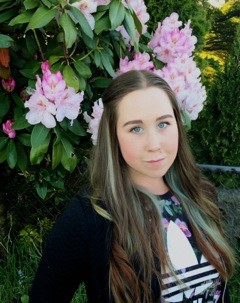
By justin lee on August 23, 2017

By justin lee on June 1, 2017
The Vancity’s Emilia Romagna Co-operative Studies Program is a study tour that explores solutions for economic, social, and environmental sustainability. This year, leading thinkers from British Columbia and Italy, including our own Centre for Sustainable Food Systems representative, join forces to take an in-depth look at the benefits a co-operative model offers to the food systems and agriculture sectors.
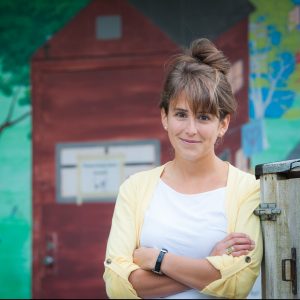
Veronik Campbell
The group will be touring the Italian region of Emilia Romagna, which is characterized by many food system co-ops large and small. This system, unified by commonly shared principles, serves as a multigenerational asset focused on sustaining the health and wealth of the region’s agriculture and distributing that wealth to individual farmers and consumers. The hope is for this food system co-operative exploration to offer opportunities to define our own collaborative approach to ensuring a more robust, equitable and sustainable local food system that is supported and celebrated as a commonly held and cherished asset. Look for Véronik’s posts on our UBC Farm newsletter, Facebook, Instagram and Twitter.
Véronik is the Academic Programs Manager at the Centre for Sustainable Food Systems at UBC Farm, where she creates and manages education, engagement, and research programs that increase the environmental, economic, and social sustainability of food systems. Véronik’s entrepreneurial and business analysis approaches ensure agri-food systems solutions lead to thriving and robust economies, environments, and communities as exemplified by her work as co-producer of Feeding Growth, a platform that supports and builds a resilient, socially just, and globally significant community of progressive food businesses.
By justin lee on April 11, 2017
Students are expected to gain a basic overview of a wide range of social justice topics and their legal implications, and to start to think critically about social justice issues and goals.
Two classes were spent engaging with the Carnegie Thursdays Writing collective in creative writing exercises around food security and the right to food. The first class was at Carnegie Centre in Vancouver’s Downtown Eastside (DTES). The second class was at the UBC Farm. The session in the Farm’s Yurt featured the reading of creative writings (poems, essays, recipes) by individuals from both groups. This was followed by a tour of the gardens. As the sun broke through the clouds, students and DTES community members picked their ways through and around the gardens, talking in small groups, stopping to poke in the mud, and connecting across difference and experience. The kind of conversations, the warmth of exchange, and the release of tensions and guard was made possible by being on the land in the Farm setting.
The prior class was spent in a classroom in the Carnegie Centre doing creative writing exercises. This added to the comfort level the two groups had with each other when we met at the Farm. Students had been assigned a number of traditional legal resources on the right to food to read before the first class to lend formal substance to their experience.
The course has student-led exercises, with student-invited guests and discussants. A number of group exercises and different methods of presenting material (mind maps, group PowerPoints, etc.) help to enhance the experience.
Simply, a fabulous experience. It changed the character of the class and was so enthusiastically responded to by the students. It was a healthy environment for learning, at a time of the year when pressures were building.

Margot Young is Professor in the Allard School of Law at the University of British Columbia. She teaches in the areas of constitutional and social justice law. She is faculty advisor for the Social Justice Specialization at the law school and has organized the Law and Society Speakers Series for close to a decade. Professor Young is in her third term as Chair of the university-wide Faculty Association Status of Women Committee. She is a research associate with Green College, the Peter Wall Institute of Advanced Studies, and the Centre for Gender, Race, Sexuality and Social Justice at UBC.
By justin lee on April 11, 2017
The global goal of this course is for students to work effectively, respectfully and collaboratively with Aboriginal peoples in the context of providing culturally-safe pharmaceutical care. Other outcomes include self-reflection and growth of cultural humility, de-colonizing the negative lens with the Aboriginal voice, understanding the historical context and generational issues that occur in Aboriginal health in Canada, enhancing library search skills specific to research in Aboriginal health, and exploring successes and challenges seen in selected health topics in the Aboriginal population.
The UBC Farm and the Traditional Medicines Walk has been a source of tremendous knowledge for our students while also providing an immersive and impactful experience. Students enrolled in PHAR 457 spend an hour and a half at the UBC Farm and participate in activities including: a song and smudging ceremony, a review and walk-through of the Indigenous plant exhibit led by a knowledge keeper, and an individual activity that highlights the different plants including medicinal/traditional uses, taste, smell and other identifying features.
The decision to bring students to the UBC Farm is made easy by the willingness and availability of the knowledge keepers who are able to share their expertise. Pharmacy students are exposed to natural health products elsewhere in the curriculum, but never with the Aboriginal voice in a holistic and immersive view.
We use a variety of different approaches to diversify our student learning experience including:
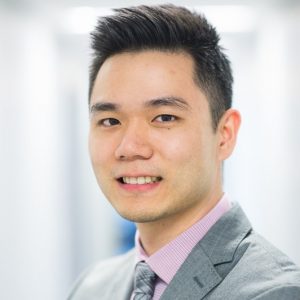 Larry Leung, BSC (Pharm), RPH, Lecturer
Larry Leung, BSC (Pharm), RPH, LecturerLarry is a lecturer and pharmacist in the Faculty of Pharmaceutical Sciences at UBC. As a pharmacist, he works at the Faculty’s Pharmacists Clinic, a licensed, pharmacist-led patient care clinic. His responsibilities include providing direct patient care and leading innovative projects in collaboration with First Nations communities in British Columbia. As a lecturer, his academic interests include interprofessional education, Aboriginal health, and contemporary issues in pharmacy practice.
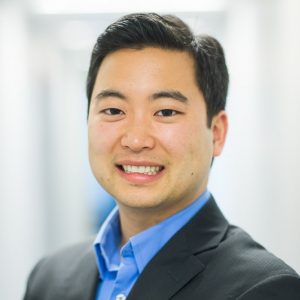 Jason Min, BSC (Pharm), RPH, Lecturer
Jason Min, BSC (Pharm), RPH, LecturerJason joined the Faculty of Pharmaceutical Sciences at UBC in 2013 in both an academic role and as a pharmacist clinician with the Pharmacists Clinic. Having coordinated and lectured a variety of topics, Jason’s academic areas of interest include First Nations health, interprofessional team-based care, and technology in health care. In his work, Jason specializes in developing, implementing, and managing innovative community pharmacy services and team-based care.
By justin lee on April 11, 2017
As a summer course for international students, mainly from China, the course was designed as an introduction to thinking about sustainable development in Canada. Field trips were organized to help students think through sustainability problems in real-world contexts. They were expected to conduct research during the field trips in order to write a field trip report that engaged critically with that week’s theme. The UBC Farm visit was included in a week where the focus was on the politics of land and food.
Given that this was the first time in Vancouver for the students, the UBC Farm trip gave us the opportunity to explore the UBC campus and the wide variety of grounded research being conducted at UBC. The trip helped to develop an understanding of some of UBC’s history, in an intellectual and political-economic sense. It also helped to give a sense of what Canadians think is important in the context of food production and agricultural research, and enabled the students to engage directly with UBC Farm employees and researchers.
The field trip was designed as part of a critical investigation for the students. Although UBC Farm employees were unaware of this, the students were asked to be proactive in asking questions so as to help develop a critical field trip report on the theme of land and food (we also visited the Sole Food Street Farms and the Yale Town Farmer’s Market). So the trip was designed to help teach research methods and critical thinking while in the field and in placing field observations into broader debates and contexts.
The tour provided by the farm was a good introduction to the farm’s activities, and engaged in some useful, relevant topics – such as how UBC Farm has been defended against urban development over the years. The Farm was a particularly useful destination, as we could walk to the farm and back within the 3-hour class time period.
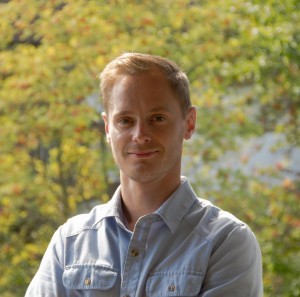 Julian S. Yates, PhD – Sessional Instructor and Post-doctoral fellow
Julian S. Yates, PhD – Sessional Instructor and Post-doctoral fellowJulian is a Post-Doctoral Fellow in the Institute for Resources, Environment, and Sustainability and a member of the Program on Water Governance team. Julian has more than a decade of experience working in the field of international development geographies, including graduate level research and employment with international development NGOs. Julian’s work focuses on the intersection between the politics of knowledge and social mobilization for overcoming poverty and inequality. His current work explores the rollout of small-scale water filtration facilities among BC’s First Nations communities – an approach that gained political expediency due to the recently introduced Water Sustainability Act.
By rachel ma on April 5, 2017
Sustainability Principles in the First Qatar National Food Guide
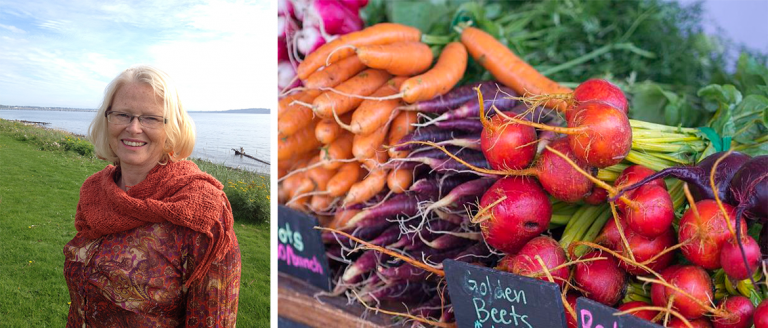
Is a healthy diet a sustainable diet? Sustainable diets have the potential to unite nutrition, food systems, healthy ecosystems, and the challenge of zero hunger. Centering on the consumption aspect of the food system, Dr. Barbara Seed’s work examines evidence-based recommendations for sustainable diets that promote both human and environmental health. This event will review how sustainable diets are defined and measured, how current sustainability recommendations have been translated into a handful of national dietary guidelines, and where recommendations can be incorporated into other levels of food policy.
When Dr. Barbara Seed was hired to develop the first dietary guidelines (food guide) in Qatar in 2013, she succeeded in making them one of the first in the world to include sustainability principles. Barbara is a Registered Dietitian with over 30 years of experience working in public health nutrition. In her work and volunteer capacities, she has straddled many sectors: government (national, provincial and municipal levels); civil society (anti-hunger and food system organizations) and academia (teaching, research, supervision, and publishing). Barbara is currently working as a consultant in food and nutrition policy, focusing on integrating nutrition, food systems, and the environment.
Free and open to the public. Event queries: ubcfarm.academic@ubc.ca
By rachel ma on March 30, 2017
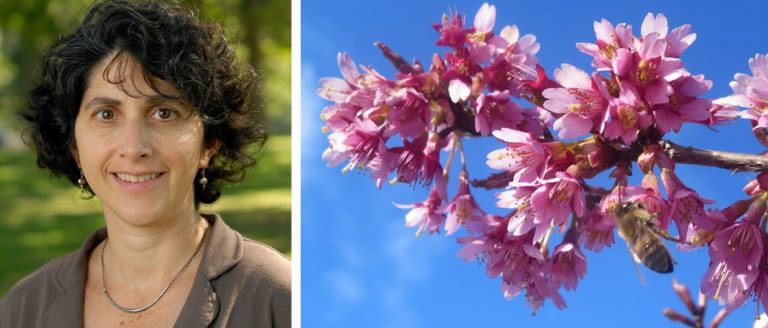
Dr. Maltais-Landry’s talk will focus on how optimal nutrient management is a critical aspect of sustainable farming systems, where nitrogen (N) and phosphorous (P) must be supplied in sufficient quantities to maximize crop yields and maintain soil fertility while preventing over-fertilization that results in environmental degradation. Organic amendments – manures and composts – and cover crops recycle N and P within farming systems, reducing the use of mineral fertilizers while potentially lowering nutrient losses to surrounding ecosystems. The aim of Gabriel’s research is to optimize the user f organic amendments and cover crops to maximize yields and balance eN and P budgets in intense agroecosystems. Using several experiments established at the UBC Farm, several trade-offs were identified among crop productivity, balanced N and P budgets, and greenhouse gas emissions (GHG), where treatments with the highest yields resulted in N and P over-fertilization and higher GHG emissions. In addition, there was little evidence that cover crops prevented wintertime N leaching from occurring, although cover crops contributed to N cycling nevertheless. Overall, my research highlights the inherent challenges in balancing N and P while maintaining high yields when using organic amendments and cover crops as primary sources of fertility in intensive vegetable farming systems.
Gabriel Maltais-Landry is a postdoctoral fellow at UBC ‘s Faculty of Land and Food Systems. He works primarily with the Sustainable Agricultural Landscapes Lab and Centre for Sustainable Food Systems.
Free and open to the public. Event queries: ubcfarm.academic@ubc.ca
By rachel ma on March 29, 2017
What is this thing called organic? How organic farming is codified in regulations
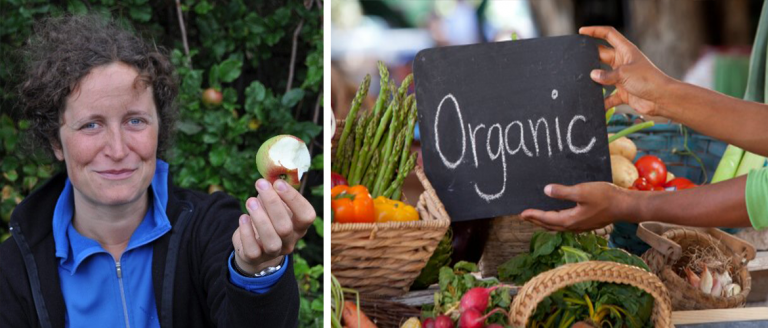
Organic farming is one of the fastest growing sectors of world agriculture. Although it represents only 1% of world agricultural area, organic is one of the most recognized food labels and most people in developed countries consume some amount of organic food today. There is a wide range of interpretations of what organic means by different actors in the sector.
This event will expand on Dr. Seufert’s research examining different organic regulations from across the world to understand how they have codified the large diversity of ideas inherent in organic agriculture.
Dr. Seufert is a Post-Doctoral Fellow in UBC’s Land Use and Global Environment Lab. She is a geographer-ecologist interested in all things food and nature. Verena believes that food is what connects us in the most fundamental ways with nature. We depend on ecosystems, and we impact ecosystems through the way we produce, prepare and eat our food. Food defines our health, our cultures, our communities, and it defines our environmental footprint.
Free and open to the public. Event queries: ubcfarm.academic@ubc.ca
By rachel ma on March 27, 2017
Whose water? Challenges and complexities in wastewater reuse in peri-urban Bangalore, India
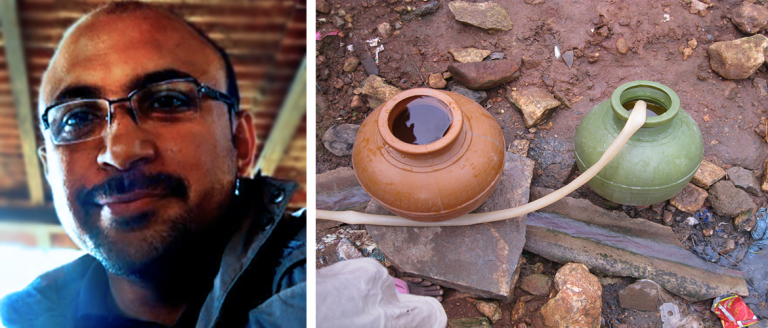
Wastewater reuse has become an accepted practice in cities and peri-urban areas. However, in developing country settings, wastewater reuse presents multiple challenges. First, water treatment infrastructure is limited, implying that water reused may not meet the required water quality standards. Second, food crops grown in peri-urban areas and irrigated with contaminated urban wastewater pose a health risk. Third, in water-stressed cities, demand for wastewater may result in competing claims over it and lead to or aggravate conflicts between various users, such as urban residents and peri-urban farmers. I will draw upon research conducted in the water-stressed city of Bangalore (also known as Bengaluru) in India and its peri-urban areas to illustrate these issues. In particular, I will focus on how peri-urban agriculture in the region has changed over the last 20 years, the role of urban wastewater and possible contestations around it.
Bejoy K Thomas is a social scientist, and Fellow in the Water, Land and Society program at Ashoka Trust for Research in Ecology and the Environment (ATREE), Bangalore, India. Bijou has a Masters in Economics (Cochin, 2001) and a Ph.D. in Development Studies (Tilburg, 2009). He has a strong record of conducting problem-driven research and working in interdisciplinary teams along with environmental scientists and engineers. His early work was on multidimensional poverty and participatory development. He has recently been part of a large research initiative on water in urbanizing areas, looking specifically at peri-urban areas and villages around Bangalore. For more information on this work, please visit- http://www.atree.org/research/ced/lwl/ACCUWa
Free and open to the public. Event queries: ubcfarm.academic@ubc.ca
By rachel ma on March 17, 2017
Worker justice & food security: Insights from Chicago’s Restaurant Opportunities Centers United and University of Guelph’s research on temporary migrant workers in Canada.
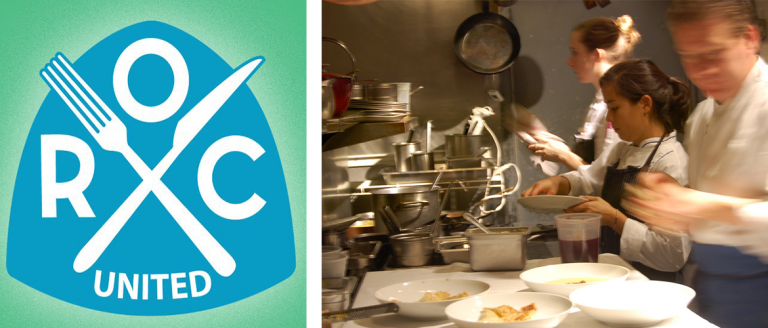
With over 13 million workers, the restaurant industry is one of the nation’s largest private-sector employers as well as one of the fastest growing segments of the economy in the United States. Unfortunately, the industry is also the lowest paying, continues to offer few to no benefits and has created industry “unofficial” standards that violate labor and human rights laws.
Restaurant Opportunities Centers United (“ROC United”) is a workers center that was born out of the 9/11 terrorist attacks and tragedy in New York City. It has grown to 18,000 restaurant worker members, 200 high-road employer members, and thousands of consumer members throughout the United States. ROC United has helped win more than a dozen workplace justice campaigns against exploitative high-profile restaurant companies, retrieving over 10 million dollars for workers and improving workplace policies for restaurant workers. Its mission is to improve wages and working conditions for the nation’s restaurant workers.
Anthony Peeples is a gruff stubborn idealist. His organic draw to labor started when he was younger, playing in punk bands and reading semi-class-conscious materials like “Profane Existence”. An organizer at heart; Anthony has been involved in the labor movement for nearly a decade. In that time, he has organized as a worker leader for a broad range of labor organizations; a traditional union, a modern organizing union, a radical union and a workers center. Anthony has experienced a broad a range of tactics and strategies to win victories for worker power. His passion lies in rank and file unionism and opposing efforts to weaken a pro-organized worker future. Anthony is a member leader of ROC-Chicago working on the One Fair Wage campaign to phase out and eliminate the sub-minimum wage for restaurant workers.
Anthony will present some reflections on his experience as a ROC leader in Chicago. The first reflection will consider previous experiences on the Illinois and Indiana border as a local labor activist, running through the ranks of union member and development and growth from a member to leader of ROC Chicago. The second reflection will consider the growing influence of workers centers in the labor movement; briefly touching on the unique alliance of eight workers centers in the Chicago area.
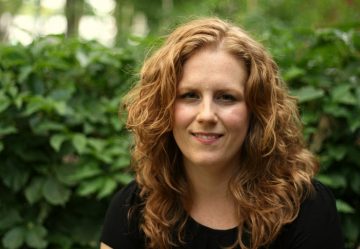
Jill Bucklaschuk is a Social Sciences and Humanities Research Council of Canada postdoctoral fellow at the University of Guelph in the Department of Sociology and Anthropology. Her work uses qualitative research methods to examine how non-permanent legal status impacts the social and workplace experiences of lower skilled temporary migrants as they negotiate settlement in Canada.